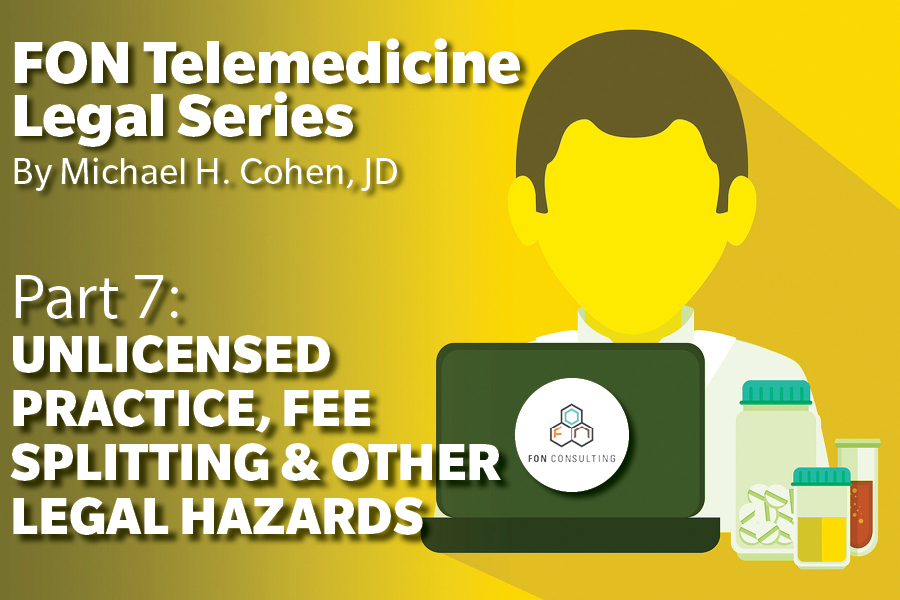Telemedicine Legal Series—Part 7: Unlicensed Practice, Fee-Splitting, & Other Legal Hazards

In this Series:
Introduction
Part 1: Practice Issues
Part 2: Licensing Issues
Part 3: e-Prescribing
Part 4: Standard of Care Issues
Part 5: HIPAA Issues
Part 6: Mobile Medical Apps
Part 7: Unlicensed Practice, Fee-Splitting, and other Legal Hazards
Conclusion
While we’ve focused this series on legal issues that frequently arise in telemedicine and telehealth, there are sister legal issues involved when healthcare practitioners and healthcare tech companies get involved. These and other critical legal hazards that routinely arise include:
Unlicensed Practice of Medicine
Unlicensed and corporate practice of medicine issues arise in telemedicine because the company offering telemedicine services is typically organized and operated by non-medical doctors. This means the founders must be sensitive not to cross the line into prohibited practice, and must structure their business model carefully as indicated below.
Let’s start with unlicensed practice of “medicine.” In almost every state, it’s a crime. It’s important to consider unlicensed practice, because telemedicine involves non-medical companies putting themselves in a place where health questions are posed by consumers.
Non-medical doctors—healthcare licensees— have a defined scope of practice. However, if they practice beyond their scope of practice, then they are considered to be engaged in unlicensed medical practice. Companies that hire and direct such persons can be aiding and abetting unlicensed medical practice.
This is true whether the practice involves healthcare in person or online.
Corporate Practice of Medicine
The corporate practice of medicine (“CPM”) rule is a variation against the rule against unlicensed practice of medicine. For more information, see: Corporate Practice of Medicine & Anti-Kickback/Fee-Splitting Rules: Deep Down the Regulatory Rabbit Hole. It’s an important rule because:
- A management services organization (“MSO”) can provide administrative/management services such as front desk/scheduling, advertising and marketing, sublease of space or equipment, book-keeping, and billing and collecting on behalf of the physician practice. These services must be provided at fair market value (“FMV”).
- California aggressively enforces CPM prohibitions. As indicated in Corporate Practice of Medicine & Anti-Kickback/Fee-Splitting Rules: Deep Down the Regulatory Rabbit Hole, the California Medical Board considers many activities by an MSO to intrude on clinical decision-making, and thereby violates CPM. Such activities include: selecting, hiring and firing the physician; approving the selection of medical equipment and supplies; owning or operating a business that offers patient evaluation, diagnosis, care and/or treatment; arranging for, advertising, or providing medical services rather than only providing administrative staff and services; and, a physician acting as “medical director.” See also: If Someone Asks You to Be Medical Director, Run.
Not all states are as tough on corporate practice of medicine. Check each state for its local laws, or have your telemedicine lawyer check into the optimum representative states for your national telemedicine venture. Currently, California, New York, Texas, New Jersey, Illinois, and Arizona are examples of user-friendly states.
Kickbacks and Fee-Splitting
Kickback and fee-splitting issues arise with telemedicine just as they do with integrative care practices, medical spas, and multidisciplinary clinical practices because these arrangements involve services under one “roof”—physical or virtual—by many different kinds of practitioners.
For more detail generally about these complex subjects, see:
- Quick Summary of Federal “Stark” Self-Referral & Anti-Kickback Law and California Self-Referral and Fee-Splitting Prohibitions.
- What Anti-Kickback and Fee-Splitting Legal Issues Arise When Physicians or Other Healthcare Providers Lease Space.
- Fee-Splitting 101 for Medical Doctors, Chiropractors, Acupuncturists, and Others.
Fee-splitting and kickback issues arise when a non-medical company attempts to maximize revenues while the physicians do the clinical work. Again, the telemedicine operation has to be carefully structured, with an eye to the issues sketched out below, to avoid the appearance that non-doctors are essentially splitting the patient fee with doctors.
Liability Concerns
The telemedicine company has to be careful in its attempts to limit its liability, to the extent possible, for the negligence of the physicians.
Enjoying this article? Subscribe and get our latest, delivered straight to your inbox.
For example, in the case of an individual practitioner, direct liability often involves malpractice (negligence), which is defined as deviating from the standard of care, thereby injuring the patient. For individual practitioners, malpractice lawsuits based on standard of care violations can trigger disciplinary action by the Board, and the converse is also true. Inadequate informed consent is a second possible theory of malpractice liability against a practitioner. It is unclear whether a company could be vicariously liable based on the practitioner’s failed informed consent. However, ensuring effective informed consent is part of good clinical practice.
The telemedicine company could be directly liable to a consumer if the company violates one of its contractual promises to the consumer, or directly liable on a tort theory if it somehow acts negligently.
Vicarious liability—liability for the acts of others—can flow up the chain as courts apply the liability to the network that provides the physician services, or to whatever or whomever appears to be the force or agent behind the physician services.
Disclaimers can sometimes help, but it’s important to understand the underlying exposure. Thus, terms of use and disclaimers often contain standard language refuting potential liability for breach of warranty, and setting limits on the company’s potential liability. These may or may not be effective. For example, what if, notwithstanding consents and disclaimers, a patient sues because the physician missed diagnosing a skin cancer that could have been detected had the exam been in person rather than online? Would the telemedicine company be vicariously liable?
Because cases take years to wind through the courts, and many are settled (rather than resulting in a published opinion), there is little, if any, law directly on point (i.e., involving exactly these kinds of facts). The best answer may be to get insurance, although again, it may not be possible to insure against this exact risk; telemedicine companies may need to rely on an umbrella policy.
Negligent Credentialing
There is another theory of vicarious liability known as negligent credentialing. Negligent credentialing is a theory of direct liability premised on a company putting forth to patients that the company has, in fact, vetted practitioners when, in fact, the company has been negligent in its quality assurance efforts, and this lack of diligence has led to a patient injury.
One way to try to limit potential exposure is to style the operation as a directory, as opposed to a medical group in which liability for physician negligence flows up and around the chain.
To the extent a telemedicine company does more than provide a directory that merely links to practitioners, and holds itself out as having checked the qualifications and credentials of a provider, the company has likely created potential liability for negligent credentialing. For example, if a contracting physician has falsified credentials, the company has not exercised reasonable due diligence to ferret out this fraud, and if a patient is injured by the contracting physician’s negligent care, then the company could conceivably face liability under a negligent credentialing theory.
As part of its risk management, the online entity should keep a file checking credentials, recheck credentials on an annual basis, and have a term of use disclaimer that the entity is not making any representations or warranties about the providers who enroll and use the site.
Disclaimers regarding the entity’s limitations of liability will be important here as well as, depending on the business model, it may be possible to argue that the company has not held itself out as vetting practitioners on its site. However, any assertions the company makes with respect to credentials, or quality of the practitioners on its site, may be used in a negligent credentialing act.
Advertising Issues
Telemedicine companies are particularly vulnerable to advertising violations because they are a hybrid legal creature, typically owned by non-doctors yet performing the marketing and providing the platform for doctors.
To understand the exposure, let’s go back to basics. The Federal Trade Commission Act (“FTCA”) prohibits “unfair methods of competition” and “unfair or deceptive acts or practices.” 15 U.S.C. §45. In general, all advertising must be truthful and non-misleading.
State law also contains prohibitions against deceptive advertising—notably in unfair competition and consumer protection statutes—and prohibits false and misleading physician advertising.
California law, for example, prohibits any licensee from communicating to the public any: “false, fraudulent, misleading, or deceptive statement, claim, or image for the purpose of or likely to induce, directly or indirectly, the rendering of professional services or furnishing of products in connection with the professional practice or business for which he or she is licensed.” In addition, if physicians are distributing dietary supplements and making impermissible disease claims, this could raise Food and Drug Administration (FDA) issues. And, to the extent standard of care issues are prevalent, off-label use could raise concerns too.
And, given the telemedicine company is providing marketing services to a physician practice, it should be aware of requirements for physician advertising. For example, in California, a physician communication can violate California law if it:
- Contains a misrepresentation of fact.
- Fails to disclose material facts.
- Creates a false expectation of favorable results (including through use of a photo or image).
- Uses a model without disclosing the same.
- Uses a “before” and “after” view of a patient in a misleading way.
- Refers to fees without fully disclosing all variables.
- Makes a claim of professional superiority.
- Makes a scientific claim that cannot be substantiated.
- Includes a misleading testimonial or endorsement.
- Contains misleading price information.
- Fails to disclose that the communication is a paid advertisement.
Violation of these rules is a misdemeanor and can subject the licensee to professional discipline.
The statute also specifies the kind of information a licensee can include in advertising such as languages spoken fluently in the practitioner’s office other than English. There are additional limitations regarding statements (for example, with respect to use of the term, “board certified”).
Contact the Michael H. Cohen Law Group for a telemedicine legal consult that fits your particular business model.
Reading this article does not create an attorney-client relationship with its author or with the Michael H. Cohen Law Group. This is an informational and educational piece; it does not constitute legal advice. If you’d like legal advice, consult an attorney for advice specific to your situation.
About FON
FON is a leading integrative health and medicine business development and strategy consulting firm. FON specializes in custom solutions for growing patient volume, developing programs, and increasing product sales. Our practical business models are driven by innovative marketing, clear messaging, and customer engagement via branded storytelling.
Contact us today to schedule a complimentary 30-minute consultation to discuss your business development or personal brand needs.






















